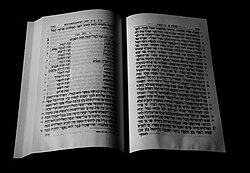Ecclesiastes 2
[1][2] The book contains philosophical speeches by a character called Qoheleth ("the Teacher"; Koheleth or Kohelet), composed probably between the 5th and 2nd centuries BCE.
[3] Peshitta, Targum, and Talmud attribute the authorship of the book to King Solomon.
[4] The chapter continues the presentation of memoir in verses 12-18 of the previous chapter, with more observations on human efforts in life, related to the question in Ecclesiastes 1:3, What profit has a man from all his labor, in which he toils under the sun?, and on the sufferings and the enjoyment of life in light of a divine dispensation.
[3] There is a similar sentiment in Proverbs 14:13: Even in laughter the heart may ache, and rejoicing may end in grief.
[12] The Apostle Paul offers an answer and consolation in the New Testament: "your labour in the Lord is not in vain" (1 Corinthians 15:58).
